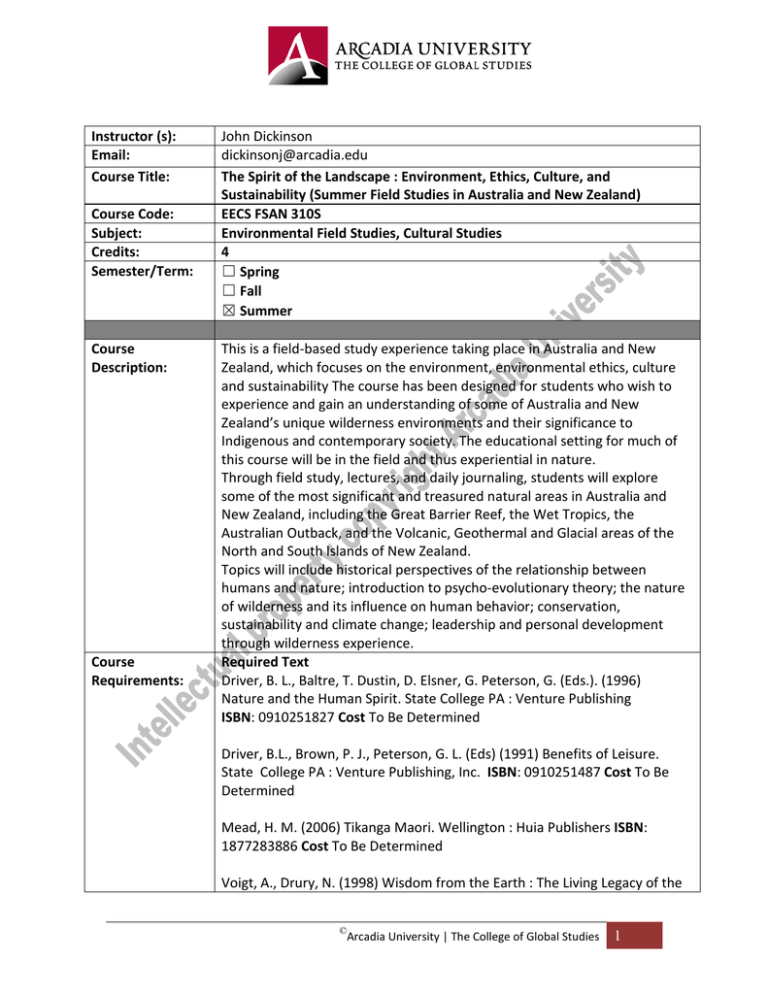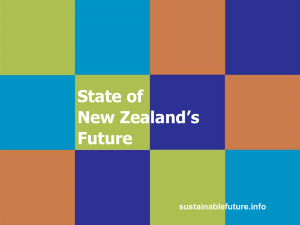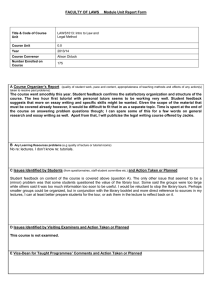EECS FSAN 310S The Spirit of the Landscape
advertisement

Instructor (s): Email: Course Title: Course Code: Subject: Credits: Semester/Term: Course Description: Course Requirements: John Dickinson dickinsonj@arcadia.edu The Spirit of the Landscape : Environment, Ethics, Culture, and Sustainability (Summer Field Studies in Australia and New Zealand) EECS FSAN 310S Environmental Field Studies, Cultural Studies 4 ☐ Spring ☐ Fall ☒ Summer This is a field-based study experience taking place in Australia and New Zealand, which focuses on the environment, environmental ethics, culture and sustainability The course has been designed for students who wish to experience and gain an understanding of some of Australia and New Zealand’s unique wilderness environments and their significance to Indigenous and contemporary society. The educational setting for much of this course will be in the field and thus experiential in nature. Through field study, lectures, and daily journaling, students will explore some of the most significant and treasured natural areas in Australia and New Zealand, including the Great Barrier Reef, the Wet Tropics, the Australian Outback, and the Volcanic, Geothermal and Glacial areas of the North and South Islands of New Zealand. Topics will include historical perspectives of the relationship between humans and nature; introduction to psycho-evolutionary theory; the nature of wilderness and its influence on human behavior; conservation, sustainability and climate change; leadership and personal development through wilderness experience. Required Text Driver, B. L., Baltre, T. Dustin, D. Elsner, G. Peterson, G. (Eds.). (1996) Nature and the Human Spirit. State College PA : Venture Publishing ISBN: 0910251827 Cost To Be Determined Driver, B.L., Brown, P. J., Peterson, G. L. (Eds) (1991) Benefits of Leisure. State College PA : Venture Publishing, Inc. ISBN: 0910251487 Cost To Be Determined Mead, H. M. (2006) Tikanga Maori. Wellington : Huia Publishers ISBN: 1877283886 Cost To Be Determined Voigt, A., Drury, N. (1998) Wisdom from the Earth : The Living Legacy of the © Arcadia University | The College of Global Studies 1 Aboriginal Dreamtime. Boston: Shambala Publications ISBN: 0731805690 Cost: To Be Determined Assignments Course Requirements Percentages 1. Satisfactory participation 10 % 2. Reflective Journal 30 % 3. Oral Presentation (30 min.) 20 % 4. Final Paper (3000 words) 40 % Total Learning Outcomes and/or Expected Student Competencies: On completion of the course, students should be able to: 1. 2. 3. 4. 5. 6. 7. 8. 9. Course Outline: 100% Learning Outcomes Discuss the historical relationships humans have had with the natural environment. Demonstrate some understanding of the influence of wilderness experience on human behavior. Recognize the impact of contemporary human existence on the natural environment and exemplify sustainable practices. Recognize the therapeutic nature of a wilderness experience Plan and execute a supervised wilderness expedition Consider our perceptions of and ways we interact with nature Identify the environmental significance of the Great Barrier Reef, the Wet Tropics, the Australian Outback and the Volcanic, Geothermal and Glacial areas of the North and South islands of New Zealand. Demonstrate an understanding of the history, traditions and beliefs of the Australian Aborigine and New Zealand Maor Identify significant flora/ fauna and geology of the regions visited Session Week 1, Day 1 Topic Arrival in Auckland for orientation. Week 1, Day 2 Lectures followed by a city and harbor tour of Auckland. © Arcadia University | The College of Global Studies 2 Week 1, Day 3 Week 1, Day 4 Week 1, Day 5 - Day 7 Week 2, Day 8 Week 2, Day 9 Week 2, Day 10 Spend the day in Rotorua followed by a hike at the Blue/Green Lakes. Proceeded by a trip to the Tamaki Maori Village where students experience music, dance, art, warrior training, learn belief systems and food. Venture to the Wai-O Tapu’s thermal reserve where they will have a lecture on ‘Geothermal Energy.’ Then take a tour of geothermal fields. Followed by lectures on contemporary Maori life in Rotorua. Fly to Nelson (South Island) where students will start a 3 day Hiking/Sea kayaking expedition in the Abel Tasman National Park (one of New Zealand’s Great Walks). This is a coastal park featuring seals, little penguins and indigenous birdlife. The area of Nelson facilitates the study of pristine inter-tidal zones and the unique flora/fauna of the region. Students will focus on conservation and protective measures taken to guard against non-indigenous predators. Fly to Christchurch. Lectures on Glaciation in New Zealand by a University of Canterbury glaciologist. Then visit the Christchurch International Antarctic Centre. Then a lecture on the importance, significance and sustainability issues of the Antarctic region. Then journey to Lake Tekapo where students will learn about the southern sky by the astronomical research program at the University of Canterbury Observatory at Lake Tekapo. Lecture on the area’s mountains and glacial lakes and discover their importance in the New Zealand hydro electricity industry. After, students will explore Mt. Cook National Park where they will hike to the Tasman Glacier and also see the southern hemisphere's highest mountain and numerous glaciers on a hike up the Hooker Valley. Depart Mt. Cook and drive to Queenstown and en-route experience the phenomenon of ‘perceived risk activities’ (bungee jumping). Lectures for this day will include expedition preparation. © Arcadia University | The College of Global Studies 3 Week 2, Day 11 Week 2, Day 12 Week 2, Day 13 Week 2, Day 14 Week 3, Day 15 Week 3, Day 16 Week 3, Day 17 Week 3, Day 18 Week 3, Day 19 The next two days will take the form of a hiking expedition along the lower regions of the world famous Routeburn Track in the South West New Zealand World Heritage Area (Mt. Aspiring National Park). This area is renowned as one of the great wilderness regions in the Southern Hemisphere, where some of the best examples of plants and animals once found on the ancient super continent Gondwana can be seen. Lecture on a review of New Zealand. And hike out and return to Queenstown. Free day to explore in Queenstown. Fly to Sydney, Australia and begin their Australian orientation. Lectures on Sydney harbor followed by a tour of the city. Students will continue lectures on Sydney, finish orientation, and have an opportunity to explore the city on their own. Students will finish their lectures and then fly to Cairs, Queensland. Lectures on the “Introduction to the Wet Tropics: Rainforest, Reef.” Followed by a visit to the Cairns Botanic Gardens with a guided tour. Port Douglas Rainforest Habitat where students will examine the ecosystems of the Australian Wet Tropics, and tropical rainforest flora/fauna. After students will venture to the Daintree river and take a cruise to learn about the complexity and importance of the flora/fauna of wet tropics estuarine rivers and hopefully spot an estuarine salt water crocodile. Students will first hand see the effects of tourism on small communities with competing priorities, and overburdened rural and suburban infrastructure resulting from increasing population. And partake in the Mangrove boardwalk interpretive. © Arcadia University | The College of Global Studies 4 Week 3, Day 20 Week 3, Day 21 Week 4, Day 22 Week 4, Day 23 Week 4, Day 24 Week 4, Day 25 Week 4, Day 26 Week 4, Day 27 Week 4, Day 28 Week 5, Day 29 Week 5, Day 30 Week 5, Day 31-32 Week 5, Day 33 A presentation on the Aboriginal myths and legends and a hikes on coral reef beaches and rainforest tracks. Optional visit to Tropical Agricultural enterprise During a drive back to Cairns via Atherton Tablelands students will visit sustainable tropical agricultural industries including a coffee plantation. Lecture on the marine biology en route to the Great Barrier Reef. Students will also SCUBA and/or snorkel with a guided tour of the Reef ecosystem. Diving/snorkeling at various reefs. Explore Cairns before departing for Darwin. Will be lectured on Darwin Botanic Gardens and learn expedition preparation. A trip to the “Window on the Wetlands”/Fogg Dam to see wetlands ecology and inappropriate agricultural practices. A lecture will be presented by the Head Ranger on managing the largest national park in Australia Conducted tour of ERA Ranger Uranium Mine and lectures by the Indigenous Elder in situ on the Ubirr World Heritage rock art. Nourlangie Rock (Burrunggui) to view art/cultural artifacts with a traditional owner. Then hike to remote waterhole and rock art sites (Baroalba) and around Anbangbang Billabong. Animal track safari with Aboriginal guide which highlights environmental interpretation, traditional bush foods and cooking methods, bush medicines and wildlife spotting. Explore the Yurmikmik region and begin a 3 day expedition to the remote waterfalls and escarpment country (home of the Jawoyn people) across untracked country Conclude hike and drive back to Darwin via Pine Creek where mining operations (gold and iron ore) and their impact on the landscape and local people will be © Arcadia University | The College of Global Studies 5 observed and discussed. Week 5, Day 34 Week 5, Day 35 Other Policies: Final presentations, course review , and a farewell dinner. Fly home to USA Expectations Professional behavior is expected of all students. This includes preparation for classes, on-time attendance at classes, attendance at all group sessions and appropriate participation in the form of attentiveness and contributions to the course. Respect for the academic process is the major guiding principle for professional behavior and extends to all communications, including e-mail. Attendance/Participation Prompt attendance, full preparation, and active participation in class discussions are expected from every student in every class session. Course Policies For e-mail communications, students must use their Arcadia University e-mail account. Students are responsible for any information provided by e-mail or through Intranet postings. Plagiarism Representation of another’s work or ideas as one’s own in academic submissions is plagiarism, and is cause for disciplinary action. Cheating is actual or attempted use of resources not authorized by the instructor(s) for academic submissions. Students caught cheating in this course will receive a failing grade. Fabrication is the falsification or creation of data, research or resources to support academic submissions, and cause for disciplinary action. Late or Missed Assignments Will not be accepted for grading. Prerequisites: Students with Disabilities Persons with documented disabilities requiring accommodations to meet the expectations of this course should disclose this information while enrolling into the program, and before leaving the United States so that appropriate arrangements can be made. None © Arcadia University | The College of Global Studies 6



